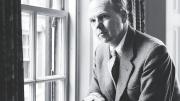Publisher Paul Dry ’66, Ed.M. ’67, has reissued The Fields of Light: An Experiment in Critical Reading (Paul Dry Books, $14.95 paper), by Reuben Arthur Brower, Ph.D. ’36, the late Cabot professor of English literature and founder of the classic General Education course Humanities 6, “Interpretation of Literature.” This edition has a new foreword by William H. Pritchard, Ph.D. ’60, Folger professor of English at Amherst, where Brower was teaching when he wrote the book, two years before leaving for Harvard. Pritchard, who was Brower’s student at Amherst and then a member of his Hum 6 staff in Cambridge, writes of his mentor, “When Brower taught in the English department at Amherst College, it was very much a teaching rather than a research-publishing enterprise.” The method, he summarizes, was “asking what the poem was ‘like’ rather than how it was structured so as to produce a ‘meaning’….” The spirit of Brower’s “experiment” in reading, Pritchard says, is suggested by the book’s opening sentences:
This is a book to read with, an experiment in critical reading. While writing it, I have always been thinking of literature as read by someone, as an active engagement between the reader and the printed page. My aim has been twofold: to demonstrate some methods of reading analysis and to use them in discovering designs of imaginative organization in particular poems, plays, and novels. A book of this sort necessarily calls for active participation if the experiment is to be even moderately successful. The ideal reader of the chapters that follow will stop to read a poem more than once, or come back to a chapter a second time after he has reread the novel or play that is being discussed. He will on occasion want to read a poem or a passage of prose aloud. Above all he will not forget that he is making an experiment, that he is learning to do something, rather than passively viewing a series of more or less revolutionary interpretations on which he is to vote “yes” or “no.” I shall not measure the success of this book by whether the reader agrees or disagrees with my interpretations, but by the way in which he interprets the next poem or the next novel he reads. If by adopting some of the methods I have used he discovers relations he had missed before, then he may agree with me that the experiment has been successful.…
There is no simple and certain way of defending critical reading, as there is no simple way of defending any educational activity. Two sorts of justifications are suggested by the two quotations at the head of this introductory note. Practice in defining the meanings of words in literature is an “instrument of a liberal culture” [Leo Stein] since it is practice in making discriminations. Practice in discovering the “masses of implications” [Le Corbusier] in a work of literary art is practice in finding relationships, in finding order in experience. These are among the primary activities of civilized men.









